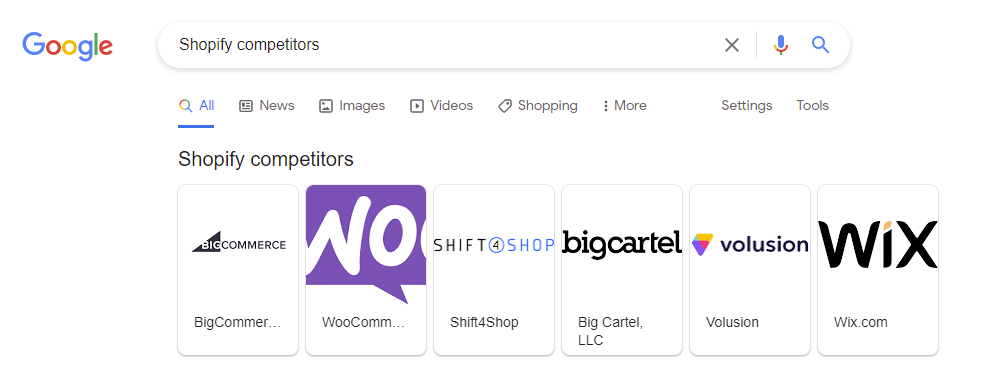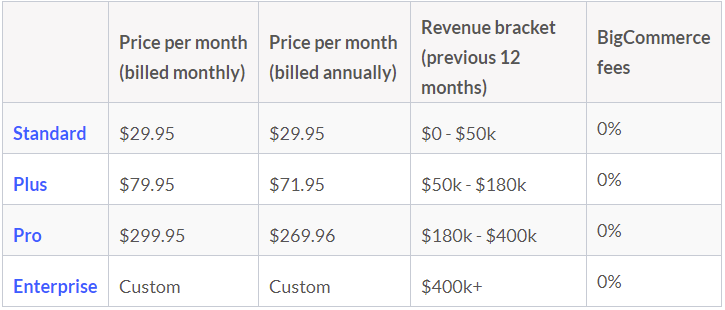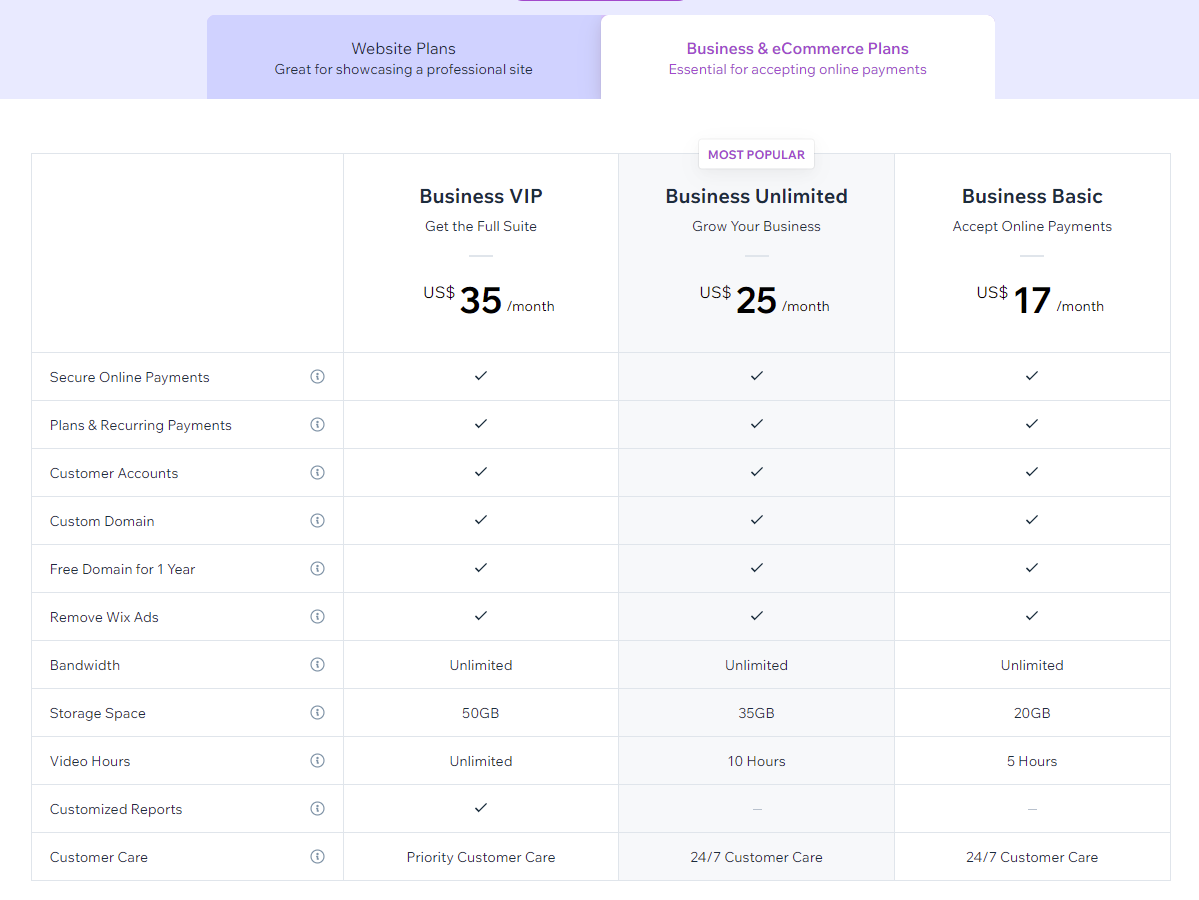If you are a dropshipper or eCommerce entrepreneur, you must have heard of Shopify. The No.1 eCommerce platform for online stores and retail point-of-sale system. It offers retailers a suite of services, including payments, marketing, shipping, and customer engagement tool. Shopify is one of the leading eCommerce platforms, but not necessarily your only choice. In this article, I will introduce the top 6 alternatives of Shopify, and explain their pros and cons in detail. Because everyone has their own opinion about these apps, so I took the top 6 on Google search results. They are BigCommerce, WooCommerce, Shift4Shop, Big Cartel, Volusion, and Wix.

BigCommerce
BigCommerce is a strong competitor against Shopify. It was founded in 2009, an open SaaS(software as a service) eCommerce builder. It has more built-in sales tools than any of its competitors and combines these features with advanced SEO and fantastic multi-channel integration. However, for beginners, BigCommerce is not that easy to use, especially when you are used to apps like Shopify. The build-in features could also limit your spending. If you’re looking forward to scaling your business, then BigCommerce is the better choice. Let’s take a look at the pros and cons.
Pros:
No transaction fees
Unlike Shopify takes a certain amount of your profit, BigCommerce won’t touch your cake. It won’t charge any percentage of your sales.
Strong market features
Its advanced marketing features allow you to promote your product on the web and increase the conversion rate. Especially, its abandon cart recovery feature can even win back 12%-15% of customers.
Multi-channel selling
Multi-channel selling with BigCommerce allows you to manage stores on Amazon, eBay, Facebook, and Pinterest.
Strong SEO performance
Extensive SEO capabilities, such as fully customizable URLs, allow you to gain free traffic and give the store exposure.
Fantastic theme designs
It has more than 100 stunning themes among other platforms.
Cons:
Not easy to start up with
If the quick startup is your priority, better to check out other platforms. The massive and powerful features also mean a long time to be invested in learning how to use Bigcommerce.
Less free themes
Only 12 themes are free to use across the industry. Bigcommerce charges monthly for high-volume stores by revenue. The more income you got, the higher you will need to pay.

WooCommerce
The second most popular platform is WooCommerce - the free plugin of WordPress. Launched in 2011, is an open-source plugin that can transfer WordPress and blogs into an eCommerce store. Powerful SEO features and organic traffic from blogs let your store surpassed others in the beginning. So let’s check out the pros and cons.
Pros:
Free and no transaction fee
The plugin itself is completely free to use with any WordPress site. And WooCommerce won’t deduct any transaction fees from your sale.
Open-source
Open-source means limitless customization. As long as you know to code, you can create all kinds of customization as you wish.
Great freedom. You will have 100% of ownership and full control of the content.
Powerful SEO and content marketing
Since WooCommerce is based on WordPress, it will also enjoy lots of powerful SEO plugins and unique custom URL service, leading your links easier to be searched by the search engine.
Cons:
Not beginner-friendly
If you are totally new to WordPress and have limited or no IT knowledge, WooCommerce may not be suitable for you. You may not be able to enjoy the benefit of open source and instead have to struggle with the building process.
Costly hosting
Even though WooCommerce is free to use, you’ll still respond for domain hosting costs, an SSL certificate, and extensions. And these things aren’t cheap.
Check these estimated prices:
Hosting ($35 - $50/month)
Security ($0 - $200/year)
Domain ($10 - $20/year)
Extension fees ($0 - $100/month)
Shift4Shop
Founded in 1997, Shify4shop has offered eCommerce software with a focus on SEO. Back to 2020, Shift4 acquired 3DCart and decided to make the platform 100% free when using Shift4 as the main payment processor. If you are an SEO junkie, Shift4shop will be a better choice for you.
Pros:
No transaction fee
Shift4shop supports more than 160 payment gateway and there is no transaction fee.
Strong SEO tool
A variety of SEO tools like Google AMP and 301 redirects make sure you rank higher and earn more traffic. Build-in blog feature allows gaining organic traffic.
Free domain name
A free domain name comes with your plan. Unlike Shopify, you will need to register a domain with cost or response for all domain hosting costs, SSL certificate of WooCommerce.
More features access
For the basic plan, Shift4shop users have more access than Shopify.
Cons:
Limited staff users
You will need to pay an extra $10 per month for per additional user.
Limited free theme
Despite the Shift4shop have many free theme options, these free themes all have a very similar design and not as modern as other platforms.
Big Cartel
Big Cartel was founded in 2005, its mainly target is to provide a free, easy-to-use product-selling service. It has no requirement on coding experience since it integrates with
Google Analytics, Facebook and PayPal. Limited features narrowed their audience group to small store owners. If you have fit their niche perfectly, Big Cartel is quite competitive.
Pros:
Low price
It starts with a free plan to $29.99 per month Titanium plan. The free plan allows 5 products and 1 image each.
No transaction fee
There is no extra charge for Big Cartel.
Simple interface and easy to use
Since Big Cartel is mainly aiming at artists and creators, there aren’t many features that made it easy to use and newbie-friendly.
Wallet-friendly
Big Cartel doesn’t need credit card information to get access to their service. They integrate with PayPal for quick check-out.
Cons:
Limited features
It has very limited features compare with other platforms. So if you are a big company owner, it won’t be a great choice for you.
Poor marketing tools
Compared with other platforms, Big Cartel has very limited marketing tools.
Volusion
Volusion is a cloud-based shopping cart which has helped over 200,000 businesses. You can access additional product video feature and tag suggested products feature without extensions. It has inventory monitor with just one click and has more than 1000 apps to access.
Pros:
More shipping integration
Volusion has more shipping integration, includes real-time shipping rates for USPS, UPS, FedEx, while Shopify only includes USPS.
No transaction fee
There is no extra charge for Volusion.
Free theme available
There are many theme options on Volusion and many of which are available. If you don’t want to spend hundreds of dollars on the theme, then Volusion will be a great alternative to Shopify.
Have CRM(customer relationship management) system
It can improve the business relationship and help with the analyze customer data.
Cons:
Coding skills required
Volusion is a cloud-based platform like Shopify. Even though the interface is quite straightforward, however, it still requires some coding experience for a better access.
Limited product
The basic plan for Volusion limited product to 100. Since the basic price is the same price as Shopify, why do we go with these 100 products instead of the Shopify unlimited products?
WIX
The final platform is WIX, found in 2006. It’s a hosted solution with nothing to install and doesn’t require coding experience. With WIX ads running on your store you can start your website for free. Wix is much easier to use than WooCommerce and gives you more freedom than Big Cartel. However, Wix is also lacking in eCommerce features and doesn't work with many different payment methods.
Pros:
Easy to use
Drag-and-drop style makes building and running your on WIX very easy. No coding experience required makes the entry barrier much lower than other web builders.
Unique design
WIX has more than 500 templates are available.
Low price and free domain
The eCommerce plan starts from $17 to $35 per month. And this plan fee is much lower than most paid web builders. And each of paid plans for eCommerce sites offers a free domain for one year.
Cons:
Limited access with the free plan
We usually check out the website performance on Google Analysis. In order to get access to this feature, you will need to upgrade to a paid plan.
Limited app for eCommerce
Although WIX has many additional apps, most apps have nothing to do with eCommerce.
Untransferrable website
The biggies drawback for WIX is that you can’t export your website. If you want to switch WIX into other platforms, you’ll have to pay tons of efforts to rebuild a website and transfer all of your data, which will be a huge headache.

Conclusion
Above are the introduction of the top 6 Shopify alternative web builders. There sure are more competitors in the market. But no matter what reason you want to choose a web builder other than Shopify, maybe the SEO, transaction cost, or the complex catalog. You can definitely find the most suitable platform among these six.

.jpg)